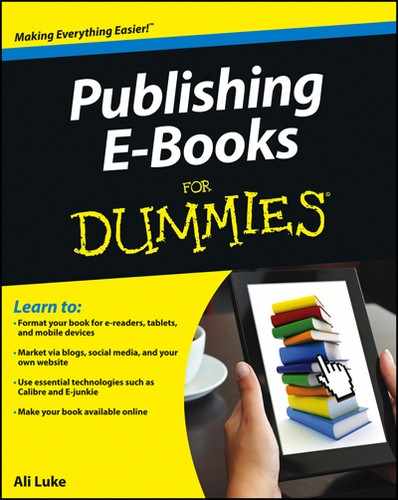Choosing Between Traditional Publishing and Self-Publishing
You can take one of two broad routes to publication: traditional publishing or self-publishing:
![]() Traditional, or legacy: You write a proposal (or an entire book, if you’re writing a novel) and find an agent or a publisher to represent you. You maintain the copyright over your work but sign over certain other rights. In return, you (usually) receive an advance and, eventually, royalties.
Traditional, or legacy: You write a proposal (or an entire book, if you’re writing a novel) and find an agent or a publisher to represent you. You maintain the copyright over your work but sign over certain other rights. In return, you (usually) receive an advance and, eventually, royalties.
![]() Self, or indie: You complete the work on your own — a task that many writers find exciting and daunting in equal measure. You write your book, and when it’s finished to your satisfaction, you publish it. You keep all rights to your book. You receive no advance, but you have the opportunity to earn a higher profit per unit sold. You retain full control — and full responsibility — over pricing, cover design, and marketing.
Self, or indie: You complete the work on your own — a task that many writers find exciting and daunting in equal measure. You write your book, and when it’s finished to your satisfaction, you publish it. You keep all rights to your book. You receive no advance, but you have the opportunity to earn a higher profit per unit sold. You retain full control — and full responsibility — over pricing, cover design, and marketing.
The rapid rise of self-publishing has divided the industry. Some agents, publishers, and traditionally published authors have raised concerns about the quality of self-published books, and though the stigma of self-publishing is no longer nearly as strong as it once was, it lingers. Several prominent authors, though, have spoken out on behalf of self-publishing; J.A. Konrath (whom I discuss later in this chapter) is a notable example.
At this point, the scales are balanced. Traditional publishing has certain advantages; self-publishing has others. In the past, traditional publishing was by far the most sensible option; in the future, self-publishing may well win out. For now, though, decide which form of publishing will work best for you and your book.
Consider traditional publishing if
![]() Your book is unlikely to sell well as an e-book — for example, if it’s aimed at a technophobic market or it’s a coffee-table book.
Your book is unlikely to sell well as an e-book — for example, if it’s aimed at a technophobic market or it’s a coffee-table book.
![]() You’re writing a book to help position yourself as an expert within your field, and you want to be associated with the name of a well- known publisher.
You’re writing a book to help position yourself as an expert within your field, and you want to be associated with the name of a well- known publisher.
![]() You want to skip the time you would have to spend acquiring the skills necessary to self-publish successfully.
You want to skip the time you would have to spend acquiring the skills necessary to self-publish successfully.
Self-publishing is likely the best route if
![]() You like the idea of retaining full control over your work.
You like the idea of retaining full control over your work.
![]() You have an existing online audience that you can market to or you’re willing to build this type of audience. (See Part V for tips on marketing.)
You have an existing online audience that you can market to or you’re willing to build this type of audience. (See Part V for tips on marketing.)
![]() You hope to make a living from your writing, so you need flexibility in pricing and promotion and in publishing on your own time scale.
You hope to make a living from your writing, so you need flexibility in pricing and promotion and in publishing on your own time scale.
If you’re unsure, give self-publishing a go. It doesn’t need to cost you much. You aren’t required to be a computer expert or to have any publishing knowledge: In this book, I walk you step-by-step through every task you need to complete.
